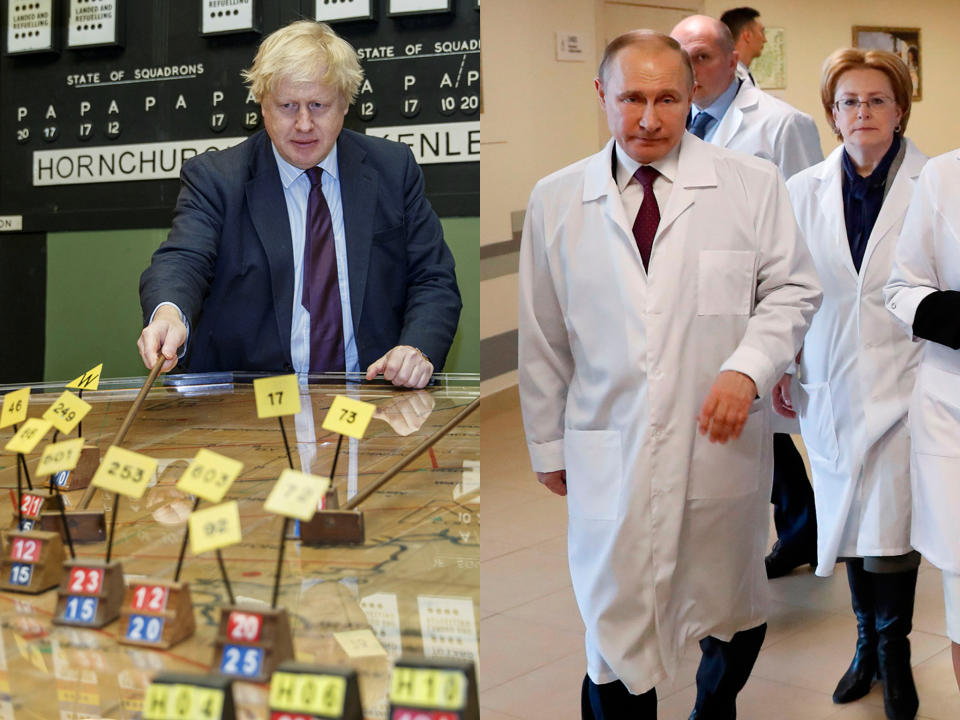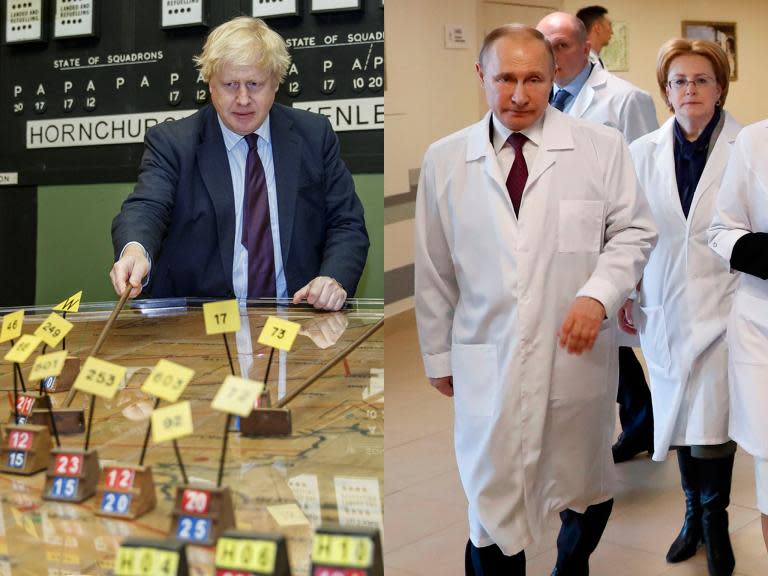War of words with Russia over spy poisoning gets personal as Johnson points blame at Putin
The Government has for the first time directly accused Vladimir Putin of ordering the poisoning of a former spy in the cathedral city of Salisbury, even as the Kremlin considered what retaliatory measures it would take to the ejecting of 23 Russian diplomats from the UK.
The Russian response may now be delayed until next week as Moscow seeks to avoid drawing attention away from its impending election.
On Friday, Boris Johnson made the incendiary claim that it was “overwhelmingly likely” Mr Putin personally ordered the assassination attempt on Sergei Skripal using a Soviet-era nerve agent, an attack which left both him and his daughter Yulia in a critical condition in hospital.
The Foreign Secretary’s comments, which appeared designed to show that Britain bears no ill will towards ordinary Russians, was denounced by Moscow as an “unforgivable breach of diplomatic etiquette”.
Mr Johnson had been speaking during a visit to the Battle of Britain Bunker museum in Uxbridge, with his Polish counterpart Jacek Czaputowicz.
Mr Johnson said: “Our quarrel is with Putin’s Kremlin, and with his decision – and we think it overwhelmingly likely that it was his decision – to direct the use of a nerve agent on the streets of the UK, on the streets of Europe, for the first time since the Second World War.
“That is why we are at odds with Russia.”
Dmitry Peskov, Russian presidential press secretary, told the state-run Tass news agency: “We have already said on many levels that Russia has nothing to do with this story whatsoever.
“Any reference or mention of our President in this connection is nothing but a shocking and unforgivable violation of the diplomatic rules of propriety.”
The UK Government has said it is “highly likely” that Russia was behind the attack, which used the “military grade” nerve agent Novichok, but until now has not directly suggested Mr Putin was personally responsible.
Mr Peskov said it had become “obvious that there is a lack of any clear proof [of Russian involvement]”. Referring to a joint statement of support from Britain’s allies, he said the “whole wave [of such statements] originated from Britain”.
Russia has refused to explain how Novichok was used to strike down the Skripals this month. They were found unconscious on a bench and remain critically ill in hospital.
The country has demanded access to the case and opened its own investigation into the attempted murders. It said it would not respond to Ms May’s allegations until it was given samples of the poison used and such samples were handed to the international Organisation for the Prohibition of Chemical Weapons (OPCW).
Downing Street announced on Friday evening that Britain had invited the OPCW’s experts to “come to the UK and take a sample”. A spokesperson said they expected this process to begin “imminently”.
Mr Putin himself was focussed on his expected re-election as president, with Friday the last day of campaigning. The issue of the poisoning was not raised during a public appearance at a medical centre in St Petersburg, his home city, and he used a TV address to urge Russians to turn out in high numbers on Sunday.
But in his daily conference call, Kremlin spokesman Mr Peskov called Britain’s allegations “against international law and common sense” and said the UK can expect Moscow’s retaliation to come “at any moment”.
The Kremlin is taking its time to develop a “considered” response to British sanctions, Mr Peskov said. The Russian reaction would be made in line with its national interests, he said, and will be announced “very soon”.
Sergei Lavrov, the Russian foreign minister, has already signalled that 23 British diplomats will be asked to leave the country, mirroring the British move against Russia’s London embassy. But there has as yet been no other signal as to how Moscow will deal with the rest of the package announced by Theresa May on Wednesday. This included the promise to step up sanctions, a threat to freeze “hostile” Russian state assets, and a wider intention to work against “suspicious” Russian money in the UK.
Mr Peskov said the Kremlin had been “surprised” by the British Government’s actions. “We haven’t seen this type of behaviour on a state level before,” he told journalists. “Delivering serious accusations against … Russia, on a ‘highly likely’ basis, is both against international law and common sense.”
Mr Johnson’s comments came as Russia was only just responding to the assertion from the Foreign Secretary’s colleague, the Defence Secretary Gavin Williamson, that Russia should “go away... it should shut up".
Sergei Lavrov said the comments suggested Mr Williamson “lacked education”.
“Well he’s a nice man, I’m told, maybe he wants to claim a place in history by making some bold statements,” Mr Lavrov said. “Theresa May’s main argument about Russia’s guilt is ‘highly probable’, while for him it’s ‘Russia should go and shut up’. Maybe he lacks education, I don’t know.” Russia’s defence ministry said he was an “intellectual impotent”. Mr Williamson studied social science at the University of Bradford.
A British policeman, Detective Sergeant Nick Bailey, was also poisoned as he went to assist the Skripals. He was still described as being in a serious but stable condition on Friday.
And speaking out in Friday’s Daily Telegraph, a member of DS Bailey’s family said he had been “very disappointed” with Jeremy Corbyn’s response to the attack.
The Labour leader’s suggestion that Ms May had been too quick to blame Russia without waiting for all the evidence was “mealy-mouthed”, according to DS Bailey’s father-in-law, William Pomeroy.
Mr Pomeroy added: “He’s said almost nothing about this and has come across as very weak on it. He seems to have been a bit mealy-mouthed about Russia’s involvement. It’s disappointing because he should be representing ordinary people like me.”

 Yahoo News
Yahoo News 

